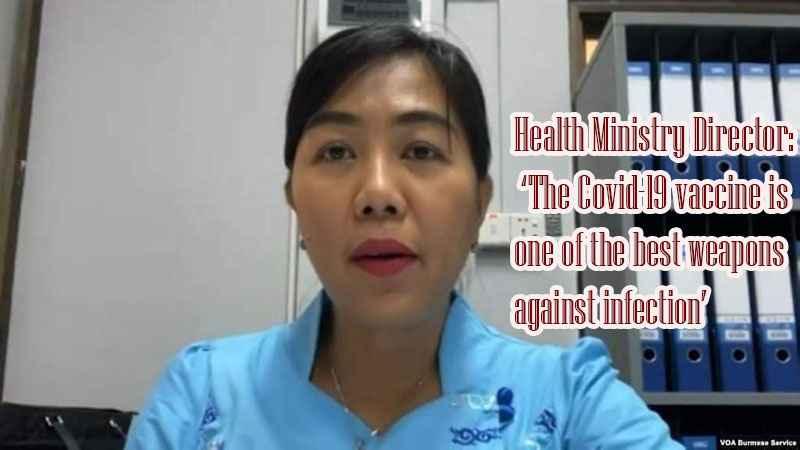- Muslim armed groups killed 162 civilians in two years in northern Arakan: HDCO report
- Arakanese migrants in Middle East on high alert amid escalating Iran conflict
- People with disabilities in Arakan State face severe livelihood hardships amid ongoing conflict
- Junta launches major offensive to retake strategic Mawchi mining town
- Extreme poverty drives Sittwe residents to dismantle abandoned houses for income
Health Ministry Director: ‘The Covid-19 vaccine is one of the best weapons against infection’
Dr. Khin Khin Gyi, director of the Public Health Awareness Division of the Department of Public Health under the Ministry of Health, recently spoke to Development Media Group (DMG) about the state of the pandemic’s ongoing third wave in Myanmar and the threat posed by the highly contagious Delta variant.
06 Sep 2021

Dr. Khin Khin Gyi, director of the Public Health Awareness Division of the Department of Public Health under the Ministry of Health, recently spoke to Development Media Group (DMG) about the state of the pandemic’s ongoing third wave in Myanmar and the threat posed by the highly contagious Delta variant.
DMG: What is the current situation of the third wave of Covid-19 in Myanmar?
Dr. Khin Khin Gyi: Currently, you can see that the incidence of the Covid-19 virus in Myanmar is less than 10%. The Ministry of Health is doing a lot of virus testing, and these days the number of suspected people who are tested is around 45,000 a day. Infection rates are below 10% and death rates are decreasing.
Another thing is that when we draw a graph of the virus infection and detection, we find that it is in the middle of the graph. We are trying our best to control the third wave of Covid-19 as much as we can. But it will take time to get to the bottom of the graph. That’s why we are conducting more tests these days. More tests are being done to make sure there is no more virus infection. This is done to control the third wave of Covid-19 as soon as possible.
DMG: What is the difference between people who have been vaccinated against Covid-19 and those who have not? For example, to what extent can we say immunity is conferred?
Dr. KKG: There is a big difference between getting vaccinated and not getting vaccinated. We want the public to know that a person who has been vaccinated is protected in 80% to 90% of cases [involving the virus’s original strain]. At the upper end, more than 90% of hospitalisations, illnesses, and deaths are prevented. When asked if the Covid-19 vaccine is 90% or 100% effective, there is no vaccine in the medical world that is 100% effective.
Ninety percent of hospital admissions were not vaccinated. The Covid-19 vaccine is really effective. People who have not been vaccinated are more likely to be hospitalised than those who have not been vaccinated. I want people to know that the vaccine is a must because it reduces the risk of hospitalisation and infection.
DMG: Highly contagious variants have been found in other countries. What are the implications for vaccinated people in Myanmar?
Dr. KKG: It will protect with efficacy of up to 60% against the mutations. Is it possible for the virus to return after being vaccinated? If you have been vaccinated against Covid-19, you may be infected again.
DMG: Some people above 65 years old in Arakan State are afraid to get the Covid-19 vaccine. They are afraid that something will happen if the Covid-19 vaccine is given. What do you want to tell them?
Dr. KKG: The Covid-19 vaccine is one of the best weapons against infection. The vaccine does not include the virus that causes the disease. I want the people to know this clearly.
The vaccine enters the body and prepares it to fight the virus. In the United States, some people are getting infected with the Covid-19 virus and are severely ill because they have not been vaccinated. Why didn’t we listen to the call to get vaccinated against the virus?
I urge the public to get the Covid-19 vaccine.
DMG: In other parts of the world, there have been reports of people being infected with virus variants. These are highly contagious. What has the Ministry of Health done to prevent these genetic mutations from infecting Myanmar?
Dr. KKG: There are four coronavirus variants of concern, namely Alpha, Beta, Gamma and Delta. There are three coronavirus variants in Myanmar and they are the Alpha, Beta and Delta variants. The Delta variant has spread to [at least] 164 countries around the world.
Delta is the worst of the variants. Delta is more contagious. Delta is also the most common family infection. Delta also increases the need for oxygen. To prevent such infections, we have to close the entrances to foreign countries. In other words, we are trying to prevent [the Delta variant] from entering our country.
The Ministry of Health is cooperating with the concerned government departments to monitor entry and exit at the border checkpoints and to prevent people from coming from some townships where stay-at-home orders have been in place to curb the spread of Covid-19. People also need to be protected from virus infection and more variants may be found. Therefore, the public needs to adhere to the virus-related regulations. People are urged to be vigilant about the risk of Covid-19 to prevent themselves from being infected.
DMG: What else would you like to say about the deadly coronavirus?
Dr. KKG: I would like to say that we have enough Covid-19 vaccines to inject 11.2 million people. The number of people who have received two doses of the Covid-19 vaccine reached 1.85 million on August 28. The number of people who have received the first dose of Covid-19 vaccine is expected to reach 2.14 million. We have now vaccinated 3 million people and will continue to vaccinate people regardless of race and religion. I would like to urge people to grab this opportunity without fail.








.jpg)











